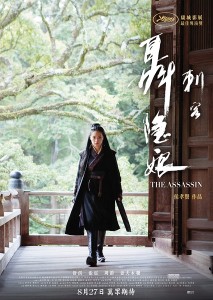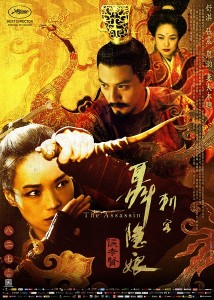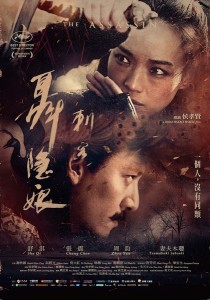The Assassin
刺客聂隐娘
Taiwan/Hong Kong/China, 2015, colour/b&w, 1.33/1.85:1, 104 mins.
Director: Hou Xiaoxian 侯孝贤.
Rating: 9/10.
Taiwan director Hou Xiaoxian’s first wuxia film masterfully blends the genre’s essence and his own style.
Northern China, Tang dynasty, early 9th century. Sent away at the age of 10 into the care of a nun, Jiaxin (Xu Fangyi), who trained her as a martial artist, Nie Yinniang (Shu Qi) is now, at the age of 23, a peerless assassin who eliminates corrupt rulers at Jiaxin’s command. However, after failing to complete her last assignment after feeling pity for her target’s young child, Nie Yinniang is ordered by Jiaxin to return home and kill her own cousin, Tian Ji’an (Zhang Zhen), to whom she was originally promised in marriage as a child. Tian Ji’an is the young military governor of the Weibo Circuit (modern Hebei province), the strongest of a series of military strongholds that comprised late Tang-dynasty China as the central government’s authority weakened. Jiaxin personally delivers Nie Yinniang back to her parents – General Nie Feng (Ni Dahong) and his wife (Yongmei) – and says her training is complete. (Ji’an’s adoptive mother, Princess Jiacheng [Xu Fangyi], was the emperor’s  sister and had been married to Ji’an’s father to keep relations cordial between Weibo and the Imperial Court. Jiacheng arranged for the betrothal of Tian Ji’an and Nie Yinniang for the same reason, giving each child half of a jade ring to symbolise their future union.) Rumours spread through the Weibo palace of a female assassin in black; and one night, while Tian Ji’an is with his favourite courtesan, Huji (Xie Xinying), he hears an intruder eavesdropping and gives chase. After a rooftop fight, the assassin slips away but leaves behind an object that Tian Ji’an recognises as Nie Yinniang’s half of the jade ring. (Their marriage, intended to take place when Nie Yinniang was 15, never happened because she had earlier caused an uproar by breaking into a well-known family’s mansion and being wounded in the process; Jiacheng had asked Jiaxin, who was her twin sister, to take Nie Yinniang away, a decision that Nie Yinniang’s parents now regret.) Meanwhile, Tian Ji’an orders one of his officers, distant relative Tian Xing, to be transferred to a distant post for causing panic and unrest
sister and had been married to Ji’an’s father to keep relations cordial between Weibo and the Imperial Court. Jiacheng arranged for the betrothal of Tian Ji’an and Nie Yinniang for the same reason, giving each child half of a jade ring to symbolise their future union.) Rumours spread through the Weibo palace of a female assassin in black; and one night, while Tian Ji’an is with his favourite courtesan, Huji (Xie Xinying), he hears an intruder eavesdropping and gives chase. After a rooftop fight, the assassin slips away but leaves behind an object that Tian Ji’an recognises as Nie Yinniang’s half of the jade ring. (Their marriage, intended to take place when Nie Yinniang was 15, never happened because she had earlier caused an uproar by breaking into a well-known family’s mansion and being wounded in the process; Jiacheng had asked Jiaxin, who was her twin sister, to take Nie Yinniang away, a decision that Nie Yinniang’s parents now regret.) Meanwhile, Tian Ji’an orders one of his officers, distant relative Tian Xing, to be transferred to a distant post for causing panic and unrest  about Weibo’s security vs. other military strongholds. Fearing for his life, Tian Xing initially fakes an illness but is finally escorted to his new post by Nie Yinniang’s father. En route, assassins attack and try to bury him alive; but he’s saved by Nie Yinniang, who rescues her father at the same time. They take shelter in a remote farmhouse. Jiaxin finds Nie Yinniang and the two women fight; neither wins but Nie Yinniang cuts off Jiaxin’s golden mask. Back at the farmhouse Nie Yinniang has a back wound tended. Meanwhile, the Weibo palace is consumed with gossip that Huji is pregnant and is trying to hide it. Tian Ji’an’s wife, Lady Tian (Zhou Yun), has already heard the news but keeps her composure, even when Tian Ji’an openly flirts with Huji during some dancing at court. Finally, Nie Yinniang confronts Tian Ji’an inside the palace grounds one night.
about Weibo’s security vs. other military strongholds. Fearing for his life, Tian Xing initially fakes an illness but is finally escorted to his new post by Nie Yinniang’s father. En route, assassins attack and try to bury him alive; but he’s saved by Nie Yinniang, who rescues her father at the same time. They take shelter in a remote farmhouse. Jiaxin finds Nie Yinniang and the two women fight; neither wins but Nie Yinniang cuts off Jiaxin’s golden mask. Back at the farmhouse Nie Yinniang has a back wound tended. Meanwhile, the Weibo palace is consumed with gossip that Huji is pregnant and is trying to hide it. Tian Ji’an’s wife, Lady Tian (Zhou Yun), has already heard the news but keeps her composure, even when Tian Ji’an openly flirts with Huji during some dancing at court. Finally, Nie Yinniang confronts Tian Ji’an inside the palace grounds one night.
REVIEW
It’s been a long wait – a quarter of a century from first news to the Cannes world premiere – but it’s been worth it: The Assassin 刺客聂隐娘, the much delayed, equally speculated-upon take on the martial arts genre by Taiwan director Hou Xiaoxian 侯孝贤, is a masterly blend of the spirit of wuxia literature and his personal film-making style. Many thought the mix would be impossible, given the genre’s reliance on action, but the 68-year-old veteran, whose last feature was almost a decade ago (the non-Asian The Flight of the Red Balloon, 2007), triumphantly proves them wrong, delivering a recognisably Hou film while refining the essence of the wuxia genre within it. Definitely not to everyone’s taste – and certainly not for the Crouching Tiger, Hidden Dragon 卧虎藏龙 (2000) crowd – The Assassin is a connoisseur item that will only grow richer with the passage of time.
Hou and longtime scriptwriter Zhu Tianwen 朱天文 have taken their inspiration from a short story, Nie Yinniang 聂隐娘 in the three-volume collection Legendary Tales 传奇 by 9th-century Tang dynasty writer Pei Xing 裴铏. Some of the finest wuxia films have had similar origins in short stories from the classics, including A Touch of Zen 侠女 (Hu Jinquan 胡金铨 [King Hu] , 1970) and Legend of the Mountain 山中传奇 (Hu, 1979), as well as the various versions of Painted Skin 画皮. Assassin is in the same mould, with the short original text allowing the film-makers’ imaginations to roam free, and the result is a movie that grafts fictional elements onto real-life people and events. Hou brought in Zhong Acheng 锺阿城, a Mainland novelist (King of the Children 孩子王, 1987) and scriptwriter (Hibiscus Town 芙蓉镇, 1986; The Go Master 吴清源, 2006), to research the period in detail, and also buried himself in the minutiae of life in the early 9th-century Tang dynasty.
The visual result is astounding, even compared with Hou’s period movie The Puppetmaster 戏梦人生 (1993), set in the first half of the 20th century, and his only other costume film, Flowers of Shanghai 海上花 (1998), set in the late 19th century. Using a combination of real locations in China and sets in Taipei, the film has a richly detailed look that, in interiors, fairly glows thanks to the photography by ace Taiwan d.p. Li Pingbin 李屏宾 (Mark Lee), with whom Hou has shot almost all his films during the past 30 years. Super-saturated colours in palace interiors create a claustrophobic sensuality that’s mirrored by the closed, gossipy society of the court; slightly less saturated colours in exteriors continue the look, while allowing the dramatic landscapes in China to dwarf the characters in a suitably fantastic way. (Locations included Inner Mongolia province, the Shennongjia Forest Region in Hubei, and Zhuozhou in Hebei, all in the north of the country.)
Costumes, by Taiwan art director Huang Wenying 黄文英, another Hou regular, are equally rich and tactile without taking liberties with history. Unlike, say, the wuxia films of Zhang Yimou 张艺谋 – Hero 英雄 (2002), House of Flying Daggers 十面埋伏 (2004) or A Simple Noodle Story 三枪拍案惊奇 (2009) – there’s no sense of theatrical exaggeration behind the production and costume design, simply a feeling of minute detail. This general sense of “compression” – from the script to design – is heightened by Hou’s decision to shoot the film in old-style Academy Ratio rather than the widescreen that’s long been de rigueur for martial arts movies. Apart from one sequence of a solo singer playing a guzheng that’s in 1.85:1, the whole film is in 1.33, including a four-minute opening sequence in b&w.
That’s not Hou’s only “perverse” decision. Staples of the martial-arts genre, like training sequences, elaborately choreographed fight sequences in spectacular locations, and even a pyramidal plot that has the hero battling his way up the ranks to the main villain, are all absent. The viewer is told about swordswoman Nie Yinniang’s 13-year training but it’s never shown, and the fights (when they come: the first semi-major one is 40 minutes into the film) are swift and almost perfunctory. Only two stand out for any kind of crowd-pleasing values – a forest rescue by Nie Yinniang and a subsequent face-off between her and her former teacher in a birch forest, both about an hour into the film.
The most pleasant surprise of The Assassin is that the absence of such elements doesn’t matter. Hou was never expected to come up with a traditional genre movie in the first place; but where some of his stylistic decisions in the past have seemed simply perverse, here they seem all of a piece. The best wuxia films – from A Touch of Zen to the recent Reign of Assassins 剑雨 (2010) or Brotherhood of Blades 绣春刀 (2014) – evoke the feeling of actually reading a classic swordplay novel, and in that sense Assassin is totally authentic, capturing the essence of the written genre (from the rapidity of the fights to the role of the natural world) in a thimble. Hou’s film proves that, ultimately, size doesn’t matter: there’s no cast of thousands, no elaborate wire-work or visual effects, and no epic tale. In their place is the simplest, purest distillation of the genre, and a mighty sense of its most important element – the characters’ place in the landscape.
As the girl brought up to be a trained killer who’s then told to assassinate her own cousin, Taiwan actress Shu Qi 舒淇, who’s been waiting years to shoot the part and is now almost 40, looks a tad old for a 20-something but has now acquired an extra gravitas that fits the role. As her quarry, now a testy young military governor, Taiwan’s Zhang Zhen 张震 carries his costumes with ease but doesn’t add much more. Better, though in a smaller role, is Mainland actress Zhou Yun 周韵 (the film director in Gone with the Bullets 一步之遥, 2014) as his regal wife, all dignity and suppressed bile. Other roles, apart from Taiwan-born, US-based dancer Xu Fangyi 許芳宜 [Sheu Fang-yi] as the assassin’s cold-hearted tutor, are basically just bits, including Taiwan’s Xie Xinying 谢欣颖 as the governor’s favourite courtesan.
On a narrative level, the film is little different from Hou’s mature works of the ’90s, with large lacunae that the viewer has to fill in, sparse dialogue, emotions that have to be guessed from often blank faces, and a propensity for long shots over close-ups. The anti-climactic ending, with no major showdown, will also leave some viewers rightly dissatisfied. But at only 104 minutes – his shortest film since Café Lumière 咖啡时光 (2004) – Hou could never be accused this time of over-stretching his material. Nor of not sticking to his guns.
The bulk of the film was shot from late Sep 2012 to mid-Jan 2014, on a relatively modest budget of NT$450 million that’s all up on the screen in the sets and costumes, despite the feeling that considerable material was left on the cutting-room floor. (Deleted scenes included whole roles by Taiwan actors Dai Liren 戴立忍 [Leon Dai] and Gao Jie 高捷 [Jack Kao].) The film’s Chinese title means “The Assassin Nie Yinniang”.
CREDITS
Presented by SpotFilms (TW), Sil-Metropole Organisation (HK), CMPC (TW), Huace Film & TV (CN), Media Asia (HK), China Dream Film Culture Industry (HK). Produced by SpotFilms (TW), CMPC (TW), Sil-Metropole Organisation (HK).
Script: Hou Xiaoxian, Zhu Tianwen, Xie Haimeng, Zhong Acheng. Short story: Pei Xing. Photography: Lee Pingbin [Mark Lee]. Editing: Liao Qingsong, Huang Zhijia. Music: Lin Qiang [Lim Giong]. Art direction: Huang Wenying. Costume design: Huang Wenying. Sound: Du Duzhi. Action: Dong Wei. Special effects: Ardi Lee.
Cast: Shu Qi (Nie Yinniang), Zhang Zhen (Tian Ji’an, governor of Weibo), Zhou Yun (Lady Tian, Tian Ji’an’s wife), Tsumabuki Satoshi (the mirror polisher), Ruan Jingtian (Xia Jing, the aide-de-camp), Xie Xinying (Huji, Ji’an’s favourite concubine), Xu Fangyi [Sheu Fang-yi] (Princess Jiacheng, Ji’an’s mother; Princess/Taoist nun Jiaxin, Yinniang’s teacher), Ni Dahong (Nie Feng, Nie Yinniang’s father), Yongmei (Nie Tianshi, Nie Yinniang’s mother), Lei Zhenyu (Tian Xing, Nie Yinniang’s uncle), Bi Ansheng (Kongkong), Zhang Shaohuai (Lady Tian’s trusted servant), Shi Jun (old herbalist, the mirror polisher’s master), Mei Fang (Nie Yinniang’s grandmother), Kutsuna Shiori (the mirror polisher’s wife) [in Japanese release version only], Dai Liren [Leon Dai] (Tian Xu, Tian Ji’an’s father) [scenes cut], Gao Jie [Jack Kao] (Yuan Yi, Tian Ji’an’s father-in-law) [scenes cut].
Premiere: Cannes Film Festival (Competition), 21 May 2015.
Release: Hong Kong, 27 Aug 2015; China, 27 Aug 2015; Taiwan, 28 Aug 2015.
(Review originally published on Film Business Asia, 22 May 2015.)
